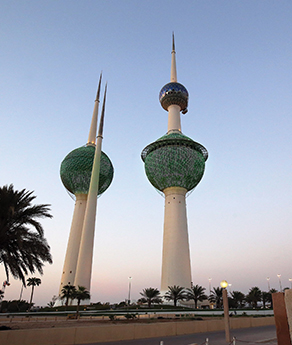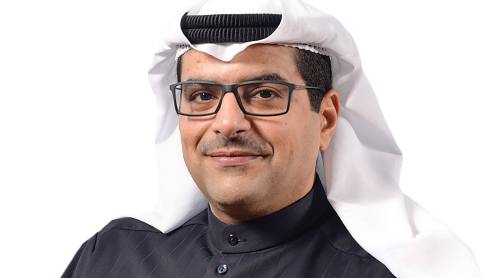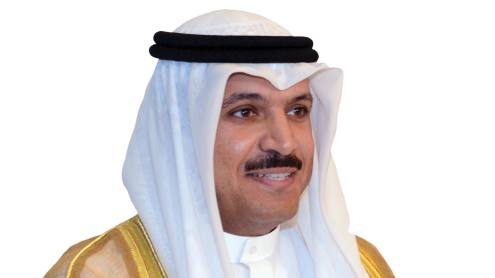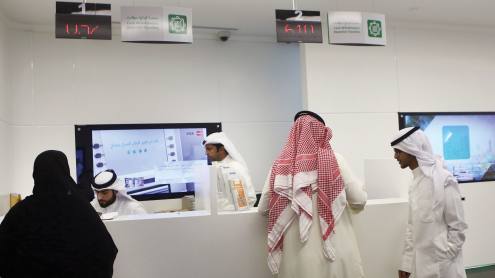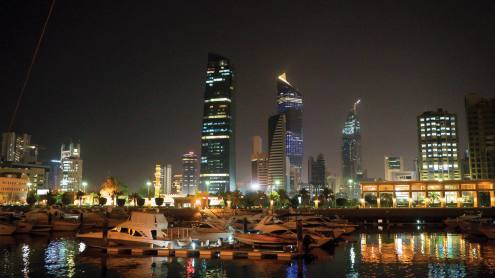Economic optimism across the six countries of the Gulf Co-operation Council (GCC) is in short supply going into the second quarter of 2020. The impact of the global coronavirus pandemic, which has prompted unprecedented social lockdowns across the region in a bid to contain its spread, has combined with an unprecedented collapse in oil prices, choking off the major source of revenue for regional governments.
“A period of low oil prices will have adverse effects on public debt dynamics, external balances and economic growth in oil-exporting [Middle East and African] economies,” said Fitch Ratings in a briefing note in early March, as the crisis began to take hold.
Further reading
- Kuwait’s prudence pays off ahead of crisis
- Kuwait CBG sees positive financial prospects
- Kuwait and allies mull co-operation with non-OPEC producers
- Kuwait Finance House chief looks to life after AUB acquisition
- Reforms put Kuwaiti stocks on investors' radars
- Kuwait’s corporate governance is put to the test
Early action
The effects of the pandemic are already being felt in Kuwait. The country was one of the first Middle East states to introduce far-reaching measures to combat the spread of the coronavirus. On March 10, Kuwait’s cabinet banned gatherings at restaurants and cafes, and ordered the closure of sports and health clubs. Flights to and from the country were suspended on March 13, and schools have been closed until at least August.
A two-week national holiday was called for March 12 to March 26, with all work ceasing in government departments and the country’s banks, with just one branch permitted to remain open in each of the country’s six governorates. The restrictions were expected to be extended as The Banker went to press.
Kuwait’s government moved quickly to establish measures designed to ease the impact on the economy. The Central Bank of Kuwait said on March 12 it was ready to provide cash to local banks, and has subsequently cut interest rates to historic lows, in line with measures taken by other central banks around the world. On March 17, the government approved a draft law authorising Kd500m ($1.6bn) of additional funding to ministries and state agencies.
Oil prices hit
Yet the main impact of the coronavirus on Kuwait’s economy is its impact on global oil prices, which have slumped as the global economy shuts up shop in a bid for containment. Making matters worse has been a price war started between erstwhile allies Saudi Arabia and Russia, which sent prices into freefall in early March.
However, while the impact of the oil price collapse on Kuwait – which relies on hydrocarbon revenues more than any of its GCC peers – is likely to be significant in the short term, the country is well prepared for such a crisis. Its fiscal break-even oil price, while still significantly above oil prices at time of writing, is lower than any other GCC state apart from the United Arab Emirates, and it has ample buffers.
“The fall in oil prices is unlikely to add significantly to pressures on the ratings of strong GCC issuers, such as Abu Dhabi, Kuwait and Qatar,” says Fitch Ratings. “These sovereigns’ ample fiscal and external buffers, illustrated by exceptionally large sovereign net foreign assets, will give them sufficient room to weather the oil price shock.”
Kuwait is particularly prepared in this regard, with its sovereign net foreign assets standing at 486.15% of gross domestic product (GDP) in 2019, according to Fitch data.
Infrastructure boost
Heading into 2020, forecasts for Kuwait’s economy were rosy: in January, the International Monetary Fund (IMF) predicted the country's GDP would grow by 3.1% during the year, compared with just 0.6% in 2019 and 1.2% in 2018. Of the six-country bloc, only Oman was expected to record higher growth for 2020. However, the IMF stressed that such growth was contingent on stability within the oil market throughout the year, warning: “A sustained drop in oil prices would generate unfavourable macrofinancial dynamics, with weakening fiscal and current account balances and widening financing needs.”
Kuwait’s budget for 2020/21, announced in January, anticipated a 7% drop in oil revenues for the fiscal year ahead, based on an average oil price of $55 a barrel for the period. At the time of writing, oil was trading at below $30 a barrel. The non-oil sector, by contrast, was expected to be particularly buoyant in 2020, thanks to the restarting of several government-led infrastructure and development projects under the auspices of the Kuwait Vision 2035 economic development plan.
While spending levels in the budget were unchanged on the previous year, the amount given over to capital expenditure increased by 21%.
“There has been a slowdown in project tendering recently which has had an impact on banks, because the government at the moment is the key driver of credit growth in the country,” said Mazin Saad Al-Nahedh, group CEO of Kuwait Finance House, speaking to The Banker in late February. “Moving forward, I think we will see more government projects being tendered in line with Kuwait Vision 2035.”
Projects still under development include the Kuwait City metro system, the $16bn Al-Zour refinery and the Sheikh Jaber Al-Ahmad Al-Sabah causeway linking Kuwait City and Subiyah across Kuwait Bay.
The public-private route
The Kuwaiti government has been particularly keen to use public-private partnerships (PPPs) as a means of increasing private sector involvement in infrastructure projects. The Al-Zour North 1 independent water and power project, completed in December 2016, was the country’s first PPP.
In January 2020, the government signed an implementation agreement for the construction of Umm Al-Hayman wastewater treatment plant by a German-Kuwaiti consortium, following the signing of an original agreement in November 2018. Meanwhile, MEED reported in March that Kuwait’s Electricity & Water Ministry had invited bids from consultants for the advisory and valuation contracts for the privatisation of the $1.26bn North Shuaiba power plant.
“Banks are fighting for PPP financing now,” says Elham Mahfouz, CEO of Commercial Bank of Kuwait. “They’re attractive projects in that you have the private sector with you as well as the government. There’s a longer tenor as well, there’s a nice stream of income, and at the end of the day it is still partially government-owned.” Yet a resumption in big spending on infrastructure projects seems a distant prospect following the impact of the coronavirus – and the dispute between Russia and Saudi Arabia – on oil prices.
“The spread of Covid-19, if not contained, will have a direct impact on revenues and would constrain the government’s ability to spend big on infrastructure projects,” M R Raghu, research head at Kuwait-based asset manager Markaz, told The Banker in early March.
Fiscal management
The impact on government revenues highlights once more the challenge Kuwait faces to rationalise government spending. In its 2020/21 budget it anticipated a deficit of Kd9.2bn for the fiscal year (after depositing 10% of government revenues into its Future Generation Fund), representing a 19% increase on the previous year. While the country can service its deficit from its General Reserve Fund (GRF), the IMF forecasts that the fund’s readily available assets would be exhausted within two years if this trend were to continue without input from other funds.
Since the decline in oil prices in 2014, governments across the GCC have moved to improve their fiscal positions, introducing measures including cutting wages, reducing subsidies on electricity and water bills, and introducing taxes. Bahrain, Saudi Arabia and the UAE have all introduced VAT.
While Kuwait made initial attempts at reform alongside its peers, the appetite for reform slowed as oil prices recovered in 2016. “We ended up with a [budget] surplus compared with projections that year and as such, all the initiatives to reform were stopped, which I think is absolutely unhealthy. You have to take drastic measures,” says KFH’s Mr Al-Nahedh.
Indeed, Kuwait has struggled to implement key reforms due to its unique political landscape within the region, and particularly the influence of its legislative authority, the National Assembly.
“The biggest difference between Kuwait and other GCC states, with the partial exception of Bahrain, is that Kuwaiti policy-makers must take into account a populist political landscape that leaves reform initiatives vulnerable to pushback from members of the National Assembly, especially if they are seen to threaten vested economic interests or constituencies,” says Kristian Ulrichsen, a research fellow at the Baker Institute for Public Policy at Rice University in Texas. “This has slowed the pace of economic reform considerably as Kuwaiti politics went through a turbulent period between 2006 and 2013 that ensnared several high-profile reform initiatives.”
Aside from the National Assembly’s general reluctance to cut subsidies and wages, the body has yet to approve a new debt law, following the expiration of the previous law in late 2017.
As a result, the country has not been able to issue debt in over two years, obliging it to finance deficits (at greater cost) by relying on the GRF. Mr Raghu highlights that conditions are “not ideal” for raising funds through external borrowing, however, thanks to the impact of the coronavirus on global markets.
Some improvements
Kuwait has made important strides in improving its business environment, in line with Vision Kuwait 2035’s aspiration to put the private sector at the heart of the economy. The country was one of the world’s 10 most improved economies in the World Bank’s influential Doing Business 2020 survey. The country jumped from 97 to 83 in the rankings, thanks to improvements in ease of starting a business, getting electricity, access to credit, and trading across borders.
As the world braces for the full impact of the coronavirus pandemic, Kuwait finds itself better prepared financially than most states in the GCC and the wider region. While lower oil prices are set to significantly dent revenues, the government’s huge financial buffers should be able to take the pressure off the economy in the short term.
Yet the crisis highlights once more the deeper challenges that remain within the economy, and the pressing need for painful but necessary fiscal reforms. Even at a time of crisis, however, the government may find it difficult to make the case for deep changes to the economy.
“Appetite for further reform always has to be weighed against the political cost of trying to push measures through parliament,” says Mr Ulrichsen. “At a time of such economic volatility and geopolitical uncertainty, the government is unlikely to risk anything it cannot be assured it has support for.”



